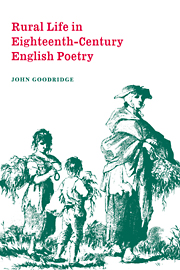Book contents
- Frontmatter
- Contents
- Preface
- Abbreviations, conventions, textual note
- Introduction
- Part I ‘Hard labour we most chearfully pursue’: three poets on rural work
- 1 Thomson, Duck, Collier and rural realism
- 2 Initiations and peak times
- 3 Three types of labour
- 4 Compensations
- 5 Homecomings
- Part II ‘A pastoral convention and a ruminative mind’: agricultural prescription in The Fleece, I
- Appendix A ‘Siluria’
- Appendix B Eighteenth-century sheep breeds
- Notes
- Select bibliography
- Index
- CAMBRIDGE STUDIES IN EIGHTEENTH-CENTURY ENGLSH LITERATURE AND THOUGHT
1 - Thomson, Duck, Collier and rural realism
Published online by Cambridge University Press: 30 October 2009
- Frontmatter
- Contents
- Preface
- Abbreviations, conventions, textual note
- Introduction
- Part I ‘Hard labour we most chearfully pursue’: three poets on rural work
- 1 Thomson, Duck, Collier and rural realism
- 2 Initiations and peak times
- 3 Three types of labour
- 4 Compensations
- 5 Homecomings
- Part II ‘A pastoral convention and a ruminative mind’: agricultural prescription in The Fleece, I
- Appendix A ‘Siluria’
- Appendix B Eighteenth-century sheep breeds
- Notes
- Select bibliography
- Index
- CAMBRIDGE STUDIES IN EIGHTEENTH-CENTURY ENGLSH LITERATURE AND THOUGHT
Summary
Jonathan Swift's complaint that The Seasons are ‘all Description, and nothing is doing’ reflects a fundamentally negative view of rural life as a serious subject for pastoral and georgic. The man credited with the idea of a ‘Newgate Pastoral, among the whores and thieves there’ could not perhaps be expected to find stimulation in The Seasons, for at the heart of James Thomson's vision is a view of the rural world that has little in common with the literary manipulations of Scriblerian pastoral and mock-pastoral. For Thomson the rural world is not only the traditional Horatian alternative to the corrupt city, but also the model for his particular philosophical views. James Sambrook divides the concerns of the poem into categories: ‘devotional’, ‘scientific’, ‘georgic’, ‘geographical, historical and narrative’, ‘descriptive’ and ‘subjective’. The poem is a ‘portmanteau’ of themes and genres, one strand of which I shall be extracting for critical attention in what follows. But it also has a central theme, a single informing idea: Sambrook's comparison with Lucretius' De Rerum Natura is helpful in this respect. Each ‘season’ has a central ‘force’. In ‘Spring’ it is the ‘Soul of Love’ (line 582), the restorative and renewing power of that season. In ‘Summer’ it is the sun, the ‘powerful King of Day’ (line 81) that dominates. In ‘Autumn’ the controlling image is more diffuse, as the poet moves between a warm benevolence reminiscent of summer, and a more forbidding environment that anticipates winter.
- Type
- Chapter
- Information
- Rural Life in Eighteenth-Century English Poetry , pp. 11 - 22Publisher: Cambridge University PressPrint publication year: 1996



